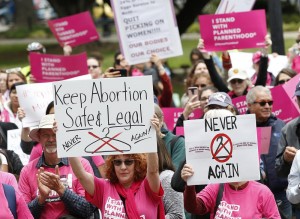Associated Press
Reporter
With more than two dozen states poised to ban abortion if the U.S. Supreme Court gives them the okay next year, California clinics and their allies in the state Legislature on Wednesday revealed a plan to make the state a “sanctuary” for those seeking reproductive care, including possibly paying for travel, lodging, and procedures for people from other states.
The California Future of Abortion Council, made up of more than 40 abortion providers and advocacy groups released a list of 45 recommendations for the state to consider if the high court overturns Roe vs. Wade — the 48-year-old decision that forbids states from outlawing abortion.
Democratic Governor Gavin Newsom started the group himself and in an interview last week with The Associated Press said some of the report’s details will be included in his budget proposal in January.
“We’ll be a sanctuary,” Newsom said, adding he’s aware patients will likely travel to California from other states to seek abortions. “We are looking at ways to support that inevitability and looking at ways to expand our protections.”
Abortion, perhaps more than any other issue, has divided the country for decades along mostly traditional partisan lines. A new decision overturning Roe v. Wade, that could come next summer, would be the culmination of more than 40 years of Conservative activism. But Wednesday’s report offers a first glimpse of how Democratic dominated states could respond and how the debate over abortion access would change.
California already pays for abortions for many low-income residents through the state’s Medicaid program. California is one of six states that require private insurance companies to cover abortions, although many patients still end up paying deductibles and co-payments.
But money won’t be a problem for state-funded abortion services for patients from other states. California’s coffins have soared throughout the pandemic, fueling a record budget surplus this year. Next year, the state’s independent Legislative Analyst’s Office predicts California will have a surplus of about 31 billion dollars.
California’s affiliates of Planned Parenthood, the nation’s largest abortion provider, got a sneak preview of how people might seek abortions outside their home states this year when a Texas law that outlawed abortion after 6 weeks of pregnancy was allowed to take affect. California clinics reported a slight increase in patients from Texas.
The report recommends funding to support patients seeking abortion for travel expenses such as gas, lodging, transportation and childcare. It asks lawmakers to reimburse abortion providers for services to those who can’t afford to pay.
The Guttmacher Institute, a research group that supports abortion rights, said 132,680 abortions were performed in California in 2017, or about 15 percent of all abortions nationally.
Planned Parenthood which accounts for about half of California’s abortion clinics said it served 7,000 people from other states last year.
A huge influx of people from other states “will definitely destabilize the abortion provider network,” said Fabiola Carrion, Interim Director for reproductive and sexual health at the national Health Law Program.
Abortion opponents in California, meanwhile, are also preparing for a potential surge of patients from other states seeking the procedure — only they hope to convince them not to do it.
Jonathan Keller, president and CEO of the California Family Council, said California has about 160 pregnancy resource centers whose aim is to convince woman not to get abortions.
“Even if we are not facing any immediate legislative opportunities or legislative victories, it’s a reminder that the work of changing hearts and minds and also providing real support and resources to women facing unplanned pregnancies — that work will always continue,” Keller said.


Comments are closed.